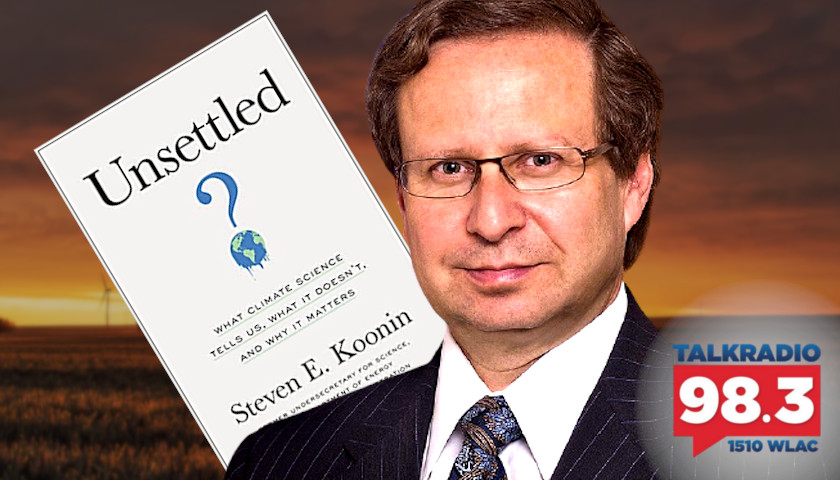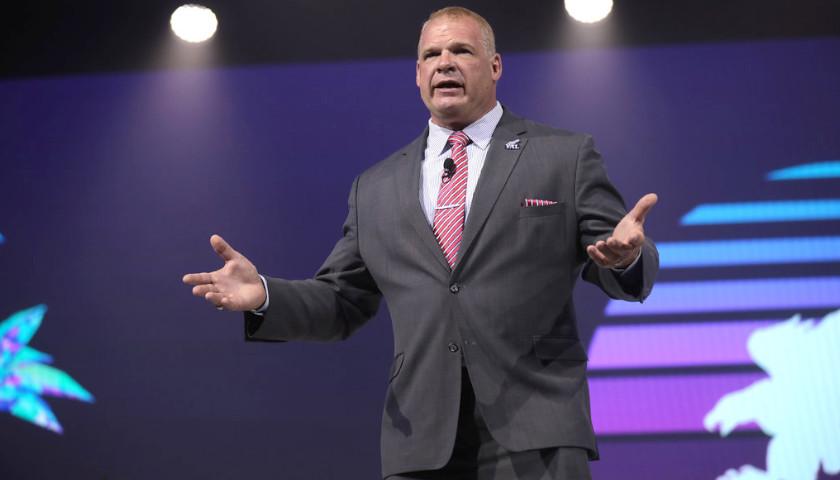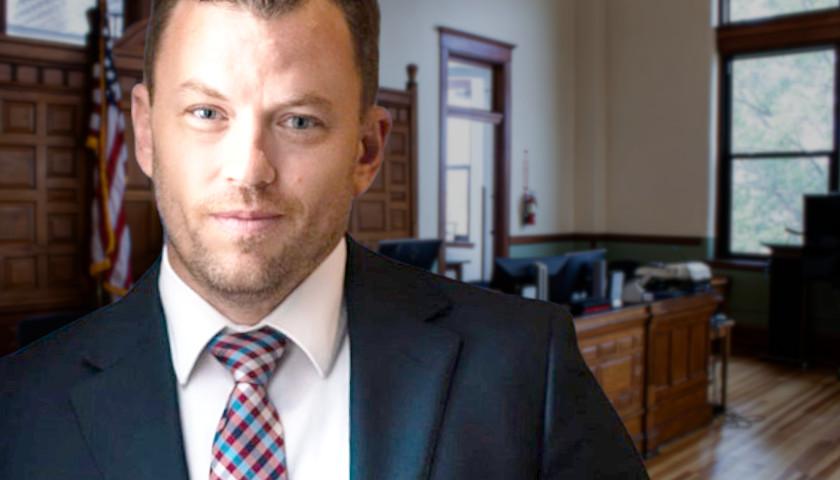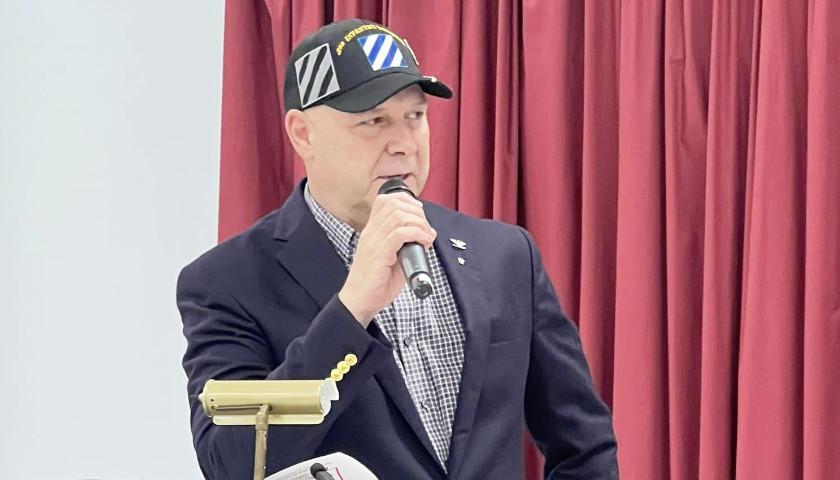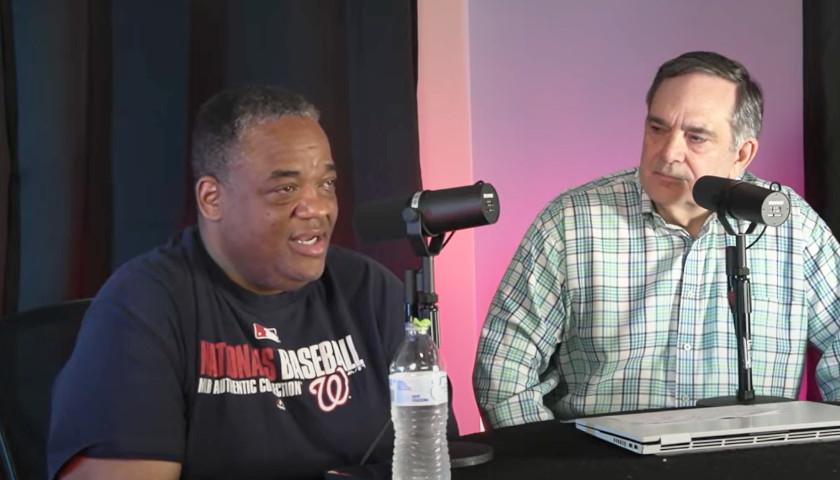Live from Music Row Friday morning on The Tennessee Star Report with Michael Patrick Leahy – broadcast on Nashville’s Talk Radio 98.3 and 1510 WLAC weekdays from 5:00 a.m. to 8:00 a.m. – host Leahy welcomed author and theoretical physicist, Professor Steven E. Koonin to the newsmakers line to discuss climate science and renewable energy viability.
Leahy: We are delighted to have author, Professor at NYU, and former Obama administration under Secretary for Science Stephen Koonin. Steven is the author of Unsettled: What Climate Science Tells Us What It Doesn’t and Why It Matters. Professor Koonin, are you with us this morning?
Koonin: I am and I’m happy to be talking to you from New York.
Leahy: Well, we are delighted to have you on the line. So tell us what does climate science tell us?
Koonin: Well, we know a few facts for sure about the climate. The globe has warmed, on average, about two degrees Fahrenheit over the last century or 120 years. We see some signs of warming. The oceans are getting warmer. We see some melting of polar ice. But beyond that, most severe weather phenomena don’t show anything outside of their natural variations. And most people are very surprised when you tell them that.
Leahy: What is the cause of that increase in the average temperature of two degrees Fahrenheit over the past 100 years? Is it, as the climate alarmist say, all because of man’s activities, or is it sort of a natural ebb and flow?
Koonin: It’s certainly a combination of both. There’s no doubt that humans are exerting an influence on the climate, mostly through greenhouse gases. And that influence is growing. But there is a lot of natural variability in the system which makes it difficult to determine the precise proportion between the human cause and natural.
If you go back 150 years, the climate was still varying a lot, and that makes it difficult to untangle today what we see between human and natural causes.
Leahy: Is this process of accelerating think over the next hundred years? What’s your best guess?
Koonin: I think we’re going to see it warm another degree Celsius, two degrees Fahrenheit over the next century. Other changes in hurricanes, in severe storms, in heat waves, I think, remain to be seen. As I mentioned so far again in the U.S. we’ve hardly seen any changes in those things.
Leahy: Should the public policy be altered dramatically to cut down on greenhouse gases, et cetera? And would it have any impact on this likely continued increase in the temperature of one degree Fahrenheit over the next hundred years?
Koonin: Two degrees Fahrenheit over the next hundred years. Whether we alter policy either in the U.S. or globally, is really a values question. What science can and should do is outline possible risks and benefits from future changes.
But in the end, society needs to decide its own risk tolerance. How much does it care about development versus the environment, intergenerational equity, and then come to some fully informed decision? Right now, the official projections say that there will be a minimal economic impact of warming of even three or four degrees.
Much more than Paris is talking about over the next century. I think we’ve going to ask ourselves whether it’s worth it or not. And we have not had that informed discussion.
Carmichael: Quick question to help our audience have a background, you are a theoretical physicist. Is that correct?
Koonin: That’s correct. For a brief career, I was for 30 years of professor and then provost at Caltech. I was for five years the chief scientist at BP, the oil company where I helped them move into renewable energy. And then for two and a half years, I was under Secretary for Science in the U.S. Department of Energy in the first Obama administration.
Carmichael: So given your background in renewable energies, are there some renewable energies that you think are going to be economically viable sooner than others?
Koonin: Yes. Some are already quite economically viable. You’ve got a lot of hydropower down in the Southeast, but it’s difficult to build more. The wind is quite economical and solar is certainly economical as well.
The problem is you cannot build a whole electrical system on wind and solar alone because they don’t produce when you need them to produce. They only produce when it’s windy or sunny.
Leahy: When Alexandria Ocasio-Cortez says the world is going to end in 12 years unless we stop global warming, I guess now it’s down to nine years. Something like that. What’s your reaction to those kinds of comments?
Koonin: She’s a politician. And when politicians talk about technical matters, I generally don’t pay them much attention. (Leahy laughs)
Leahy: A good policy.
Koonin: I wish she, Greta, Bernie Sanders, Joe Biden, and John Kerry would read my book because they will discover that the actual science doesn’t say what they think it says.
Carmichael: With all due respect, they’re not going to read your book because they need plausible deniability.
Koonin: Yeah.
Carmichael: And if they read your book, then they have to admit that there is another side of the argument. By the way, I own your book. It’s number three on my list to read.
Koonin: Okay, good. I hope you’ll find it an interesting and engaging read. Many people have.
Carmichael: Well, thank you. I’m looking forward to it.
Leahy: Professor Koonin, so now your book is out. What kind of reaction have you gotten from a, your academic community, and your peers in theoretical physics and climate science, and then b, generally in the public?
Koonin: Many of my colleagues with a scientific or engineering background say, wow, this is really interesting and useful. I’m glad you did it but watch out. And in fact, the climate science community is already after me with a couple of bad reviews, even though everything in the book is from the official report.
Leahy: Are they dishonest when they do something like that?
Koonin: Yeah, I think so. I think so. There are a lot of people invested in the climate crisis and laying down the fact that there is no crisis is not going to please them.
Leahy: Because of this book, is the New York University going to put you on the bad Professor list and do something to harm your situation, or are you going to be okay?
Koonin: Well, you know, having once been pretty much in charge of a university, I’m very sensitive to the tensions between the administration and the faculty. And so when the book was just about finished before it was published, I had a conversation with the leadership at NYU.
And I’ve got to say they said the right things, namely, Steve, were behind you. You’ve got the academic freedom to say what you’re saying. We expect you’re right because we know you’re a rigorous guy, we’ve got your back. And so far, it’s been wonderful.
Leahy: Well, that is very encouraging.
Carmichael: That really is. That’s good. It’s discouraging but unsurprising that you’re getting pushed back by people and they’re really trying to attack your character when all you’re doing is what any good scientist would do in that is study the facts and present them for laypeople like me to be able to understand them.
Koonin: As an educator, my greatest story is just getting people to understand. In the end, I don’t care which way this comes out. But let’s do it where everybody’s got a good understanding of what’s
Leahy: Professor Stephen Koonin, thanks so much for joining us today. Author of the book Unsettled: What Climate Science Tells Us What It Doesn’t and Why It Matters. Come back in about a month and tell us how everything’s gone in the public release of this Dr. Koonin. And thank you for joining.
Koonin: I’d be delighted to chat again.
Listen to the full third hour here:
– – –
Tune in weekdays from 5:00 – 8:00 a.m. to the Tennessee Star Report with Michael Patrick Leahy on Talk Radio 98.3 FM WLAC 1510. Listen online at iHeart Radio.
